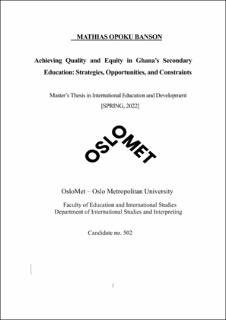Achieving Quality and Equity in Ghana’s Secondary Education: Strategies, Opportunities, and Constraints
Master thesis
Published version
Permanent lenke
https://hdl.handle.net/11250/3063261Utgivelsesdato
2022Metadata
Vis full innførselSamlinger
Sammendrag
The increasing completion rate of primary education has led to an increase in demand for secondary education (SE) worldwide. This phenomenon has been necessitated by the pressure of modern economies seeking young people with sophisticated skills, knowledge, and competence that cannot be developed only from primary education. Given the global need and emphasis on secondary education, massive investment has been made in many countries to make this level of education available and accessible to all individuals. However, despite the intense desire and the investment made, issues of availability and accessibility of secondary education are often hampered by inequities in the provision of this public good along spatial dimensions. The challenge facing developing countries in their attempt to expand secondary education is that they mostly sacrifice quality for quantity. This trade-off creates a situation where the products of beneficiaries of secondary education do not possess the requisite skills, knowledge, and competence for sustainable living. This study aims to analyze educational strategies implemented in SE in Ghana and how those policies are geared towards improving access, bridging the equity gap, and improving quality. The research employed a combination of qualitative document analysis and semi-structured interviews to answer the study's research questions. The interviews were conducted via Zoom with three categories of participants, namely the heads of SHS, teachers, and parents. Seven interviews were conducted with participants from two schools. The major findings from the study included the prevalence of class and social divisions in access to high-status SHS as high-status SHS in urban centers are not within reach of people from poor quintile, the prevalence of gender disparity, PWD in SHS faces discrimination and stereotypes, lack of continuity of policies, teaching to test instead of the acquisition of skills. CSSPS, FSHS, and SEIP were found in the study as a major strategies to improve quality and equity in SE. The study recommends that the use of the bottom-up approach in policy development,formulation, and implementation, adopting sustainable local financing alternatives to donor support in policy financing, and effective decentralization.
